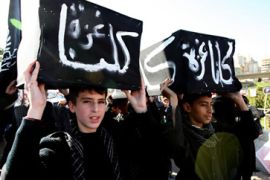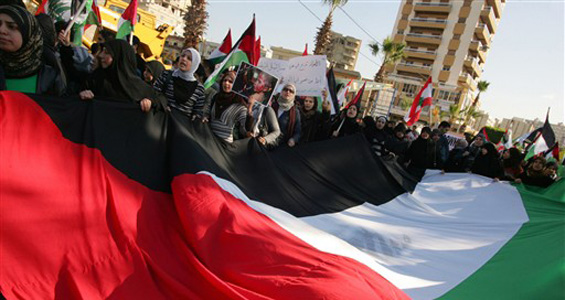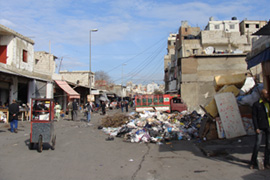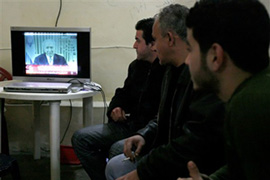In Lebanon ‘we are all Gaza’
Palestinian refugees in Lebanon are closely following events in Gaza as they unfold.

 |
| Lebanese protest against the Israeli offensive in Gaza [AFP] |
As the Israeli army continues to expand its ground war inside Gaza, and despite the distance, Palestinians in Lebanon remain almost, if not equally, as concerned as those in their native land.
Although there have been historical tensions between Lebanese and Palestinians in Lebanon, both groups have been united by the latest outburst of violence in Gaza.
Throughout Beirut there have been daily protests and “we are all Gaza” is an almost ubiquitous slogan that can be seen on cars, buildings and faux coffins across the country.
This unity has even carried over into the political realm.
While Lebanese politicians squabble endlessly over the minutiae of internal politics there is now at least some sign that they are capable of brooking agreement: since the Israeli assault began the three highest public officials Michel Sleiman, the president, Fouad Sinoria, the prime minister, and Nabih Berri, the speaker of parliament, have all publicly condemned the offensive.
The Lebanese government has also offered aid and supplies to help relieve the suffering in Gaza.
‘One people’
Lebanon’s often-tumultuous social and political fabric, comprised of eighteen officially recognised sects, is also home to a significant number of Palestinian refugees.
| IN DEPTH |
 Latest news and analysis from Gaza and Israel |
 Track the war and submit your own reports |
 Send us your views and eyewitness videos |
 Watch our coverage of the war on Gaza |
According to the United Nations Relief and Works Agency (Unrwa) there are 416,608 registered Palestinian refugees in Lebanon – all of whom are either from what now geographically constitutes Israel and Palestine or are direct descendents of those that are.
So the question of what happens to Palestinians in Gaza is equally prescient for Palestinians in Lebanon.
“We are one people so what is happening in Gaza is something we all share,” said Kassam Aina, the general director of Beit Atfal Assumoud, a non-governmental organisation that works among the Palestinian community in Lebanon.
For Aina, who was born near the Galilee, Israeli aggression towards Palestinians is nothing new. Beit Atfal Assumoud’s offices are located in the Sabra and Shatila Palestinian refugee camps in the south of west Beirut.
In 1982 the camps were the site of an infamous massacre by Lebanese militiamen as Israeli soldiers and tanks encircled the camps, allowing it to happen.
Communicating with family
In the normally bustling Sabra and Shatila, it is apparent that the residents are concerned. The streets are empty and many shops are closed.
“We are glued to the television sets 24 hours a day. Everyone is worried. Some families haven’t been able to get in touch with their families in Gaza. So it’s very difficult on all of us,” says Mahmoud, a 24-year-old who has lived in Shatila his entire life.
Despite exorbitant mobile phone rates, poor coverage inside the camps and the difficulties of making calls from Lebanon to Israeli phone exchanges – technically it is illegal – some families have been able to get in touch with their relatives in Gaza.
 |
| The streets of the Shatila refugee camp are unusually quiet [Christian Porth] |
Ahmad Abou Rayya, a Palestinian refugee who grew up in Gaza but now works as a dentist in the Sabra camp, has not been so lucky.
“I don’t know how my family is doing anymore,” he says.
“I spoke to them when the fighting began but I cannot any longer.”
Abou Rayya is the only member of his family living outside Gaza. When he was still able to get in touch with his family, he learned that his niece had been killed during the first day of air strikes and that his nephew was a member of the graduating police class killed in a later air raid.
“I know what it’s like there. I know the roads and areas and where the Israeli tanks are near Jabilya. I can see in my mind where they are. It keeps me awake at night,” he says.
Voiceless
In Ain el Helwe, the largest Palestinian refugee camp in Lebanon, the mood is similarly somber.
Khalil Aly, a refugee who lives in the camp, says: “Every night people are getting together to talk and to pray. Both parties, different religions but we’re all together and that helps us.”
He acknowledges, however, that other than donating money, there is little the Palestinians outside of Gaza can do.
“As Palestinians, what can we do?
“We can’t speak out politically because there is no Palestinian state with a government we can speak to, so we have no voice. All we can do is stand in solidarity with each other.”
Peace through strength
For Hani, a Lebanese-Palestinian who is originally from Jaffa but now works as a lawyer in a prestigious Beirut law firm, there is no easy solution to the ongoing Palestinian-Israeli conflict.
“I am worried. I feel unsafe. I feel like I have been unjustly treated and cannot build a vision of my own future,” he says.
“Objectivity cannot be applied over blood and crimes,” he adds.
In Lebanon, Palestinians of all stripes, agree that the only lesson they have learned from Israel in 60 years of conflict, is that strength is the only way to gain political concessions.
Aina explains: “If you are not strong, you cannot reach peace.”
“We’ve learned the a-b-c’s of resistance: have rockets, throw rockets, negotiate and then have more rockets to throw again,” Hani says.
While there are divisions among Palestinians, including those now living in Lebanon, Hani says that support for Hamas has grown stronger as a result of Israel’s assault.
This is a point that he does not feel in conveyed well in the media. He explains that you do not have to be with Hamas to be opposed to Israel’s actions.
“I don’t believe in God, I don’t believe in any holy books. I just want justice in this region. We are not Muslims fighting for any ideology, we are people suffering and all we ask for is justice,” he explains.
Identity
For Palestinians in Lebanon, the issue is not one of Hamas versus Israel or the Palestinians versus the Israelis; it is centred on the notion of identity and citizenship.
“I’ve been a refugee my whole life,” Abou Rayya says.
 |
| In Lebanon, everybody is closely following the events in Gaza [AFP] |
“I lived in Gaza but … was born outside of Gaza and have never been able to return to my birthplace.
“How have I been around for 60 years without an identity?”
He goes on: “All I have is a piece of paper from the United Nations that says I am a refugee. I have a right to have an identity. I have a right to have a country, to be from somewhere.”
For Hani, if the West truly believed in the nation-state and the sense of identity provided by citizenship, then “Israel should not be defined as a Jewish country. Palestine should not be defined as a Muslim country. A country has no religion and a country should not have a religion”.
“If I want to dream, I will go to bed and wake up one morning and Israel will call itself a democracy, not a ‘Jewish democracy’,” he says, arguing that there is no place in international law for such a narrowly defined state.
Refugee rights
Another issue of importance to Palestinians in Lebanon revolves around the civil rights of Palestinian refugees inside Lebanon, where their right to work and own property is severely limited.
“I hope that the new parliament that will come after the elections will make the changes that are needed. We aren’t asking for citizenship or for nationality, we are simply asking for simple human and civil rights,” Aina says.
Given that the definitions of Palestinian legal and civil rights are 60 years old (UN resolution 194), Hani feels that the time to reassess them, and in particular the contentious ‘right of return’ issue, is long overdue.
“Israel joined the UN on three conditions. One was to apply resolution 194 – the right of return. So, if the international community can redefine it, Arab countries can redefine it in their states.
“A referendum is needed on the right of return but it is unacceptable at this point since we are without a country,” he says.
Lebanese fears
Of course, for Lebanese generally, there are fears that the situation in Gaza may have wider repercussions.
In 2006, Israel fought a ground war with the Lebanese Shia group, Hezbollah, inflicting massive damage on Lebanon and Lebanese infrastructure.
While Hezbollah, thus far, has limited its support for Hamas to rhetoric, a still unknown group launched three katyusha rockets into Israel from southern Lebanon last Thursday.
Both Hezbollah and Hamas in Lebanon have denied firing the rockets and Israel blamed an unnamed Palestinian organisation. However, no group has yet claimed responsibility. The pro-Syrian Popular Front for the Liberation of Palestine-General Command (PFLP-GC) also gave a vaguely worded statement neither confirming nor denying responsibility.
While Palestinians worry about their brethren in Gaza, the Lebanese are also worried. Israel has played down the rocket attacks, but Israeli military officials have made threats that a similar, if not greater, response to that seen in Gaza, will be applied against Lebanon if hostilities were to start.